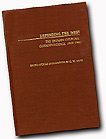 As World War II slowly fades into history, old veterans are now giving their tales a final telling. Memoirs, books and final recollections fill the bookstores looking back on that great event that so marked and divided the world.
As World War II slowly fades into history, old veterans are now giving their tales a final telling. Memoirs, books and final recollections fill the bookstores looking back on that great event that so marked and divided the world.
In the midst of such a plethora of material on World War II, there is little talk on its aftermath. Indeed it might be argued that what happened immediately after the surrender of the Axis powers shaped world history almost as much as the dramatic event itself.
Covering this fascinating time, Prof. Gregory W. Sand provides insight and historic perspective in his masterful work, Defending the West: The Truman-Churchill Correspondence, 1945-1960.
Completing previously published wartime correspondence between Churchill and Roosevelt up to the latter’s death in 1945, this book records the thoughts and decisions of Truman and Churchill from April 12, 1945, nearly a month before Germany’s surrender, until Churchill’s defeat in the General Election in late July 1945 at Potsdam. It further provides a documentary record of their later official and private correspondence extending from Potsdam to Churchill’s second premiership (1951-1955) and finally to their more personal correspondence which would continue into Churchill’s retirement.
As part of the Contributions to the Study of World History series, the 2004 book, just released by Praeger Publishers, thrusts the reader into an end-of-the-war scenario in much the same way as President Truman was driven upon Roosevelt’s death.
It becomes clear that the conflict’s aftermath was not just the end of a war but the beginning of another one. With extensive headnotes, Prof. Sand traces the major concerns of the two victorious powers as they headed toward a series of crises that eventually gave rise to the Cold War.
Poland, Italy’s Venezia Guilia, and the Austrian occupation were all matters that immediately threatened world peace. In the power vacuum that followed the Allied victory, the letters document the perfidious actions of Stalin who shamelessly exploited postwar chaos to build an “Iron Curtain” right down the middle of Europe.
Prof. Sand weaves together the threads of the two leaders’ lives as he follows their postwar careers. Their friendship was especially cemented by their meeting at Fulton, Missouri, where Churchill would deliver his famed “Iron Curtain” speech introduced by President Truman. With Churchill’s second premiership, their official correspondence resumed and with it all the problems raised by the Cold War.
While the book is excellent historical resource, the personal aspect cannot be divorced from the letters. More than just a political alliance, the book records an evolving friendship. What began as official dispatches with few personal references soon became formal correspondence addressed to “Mr. President” and “Mr. Prime Minister.” This would later become the more intimate “My dear Sir Winston,” and “My dear Harry.” In a similar way, both men in the later years would send their best regards to the other’s spouse and children and extend thoughtful courtesies.
Prof. Sand, Adjunct Professor of History at the Saint Louis College of Pharmacy, has provided this first full scholarly edition of the Churchill-Truman correspondence which will be an excellent chronicle of the aftermath of the war and will aid students in understanding this important period of world history. In documenting Stalin’s brash postwar politics, it is a lesson in perfidy. By describing the eventual Anglo-American response, it is a confirmation that weakness has its terrible consequence and real peace can only bought through strength.
Defending the West: The Truman-Churchill Correspondence, 1945-1960
(Contributions to the Study of World History)
Hardcover; 264 pages; Dimensions (in inches): 0.95 x 9.52 x 6.14
Publisher: Praeger Publishers; (March 30, 2004)
ISBN: 0313283303
About the Author: Prof. G. W. SAND is Adjunct Professor of History at the Saint Louis College of Pharmacy. He holds a Ph.D. in American and Modern European History from Saint Louis University. He has also been a member of the Liberal Arts faculty of Concordia University Wisconsin, St. Louis Center, since 1994, and is the author of two books in 20th Century History and International Relations. In 1999-2000, he was a Visiting Fellow at Churchill College, Cambridge, England.

